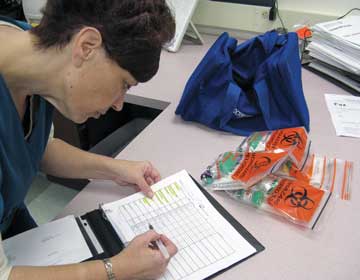It's easy to blame this case of wrong-person surgery on the pathologist who admittedly mixed up biopsy slides, but we're still left to wonder what if anything the OR team could have done to catch the case of mistaken identity and save a cancer-free patient from a radical prostatectomy that left him impotent and incontinent. The answer, sadly, might be there was little anyone in the OR could have done to prevent this case of wrong-person surgery.
Rick Huitt, who'd just retired after 41 years on the factory line at John Deere, was told by Iowa Clinic (West Des Moines) urologist Carl Meyer, MD, that he needed a radical prostatectomy. The problem? He didn't. Someone else did. Joy Trueblood, MD, a pathologist at Iowa Clinic, had mixed up slides of Mr. Huitt's non-cancerous tissue sample from his prostate cancer screening with those of another unidentified man who had extensive cancer.
After the unnecessary prostatectomy, Dr. Meyer sent Mr. Huitt's prostate to a pathologist at the Iowa Methodist Medical Center, who examined the gland and found no cancer. Dr. Meyer informed the Huitts of the finding, then sent the biopsy slides and the pathology specimen of Mr. Huitt's prostate to the Mayo Clinic, which confirmed the cancer-free diagnosis.
In their civil action, the Huitts accused Iowa Clinic of negligence in the handling, processing and reporting of cancer in Mr. Huitt's biopsy samples, which they said led to "permanent injury and damage" — specifically, physical and mental pain and suffering past and future, and loss of full mind and body past and future.
In court, Mr. Huitt's wife of 45 years and co-plaintiff, Judy, said the couple's active sex life was devastated by Mr. Huitt's post-operative impotence and incontinence, caused by nerve damage suffered during the surgery. She testified that his penis had become shorter, and that he needs to wear several urinary pads every day. "They never told us they were sorry. Never once," she told the Des Moines Register of Iowa Clinic.
It gets worse. The Register also reported that, according to Judy Huitt, the patient who actually had cancer was told he didn't, and wasn't correctly diagnosed for at least another 4 months.
.svg?sfvrsn=be606e78_3)

.svg?sfvrsn=56b2f850_5)